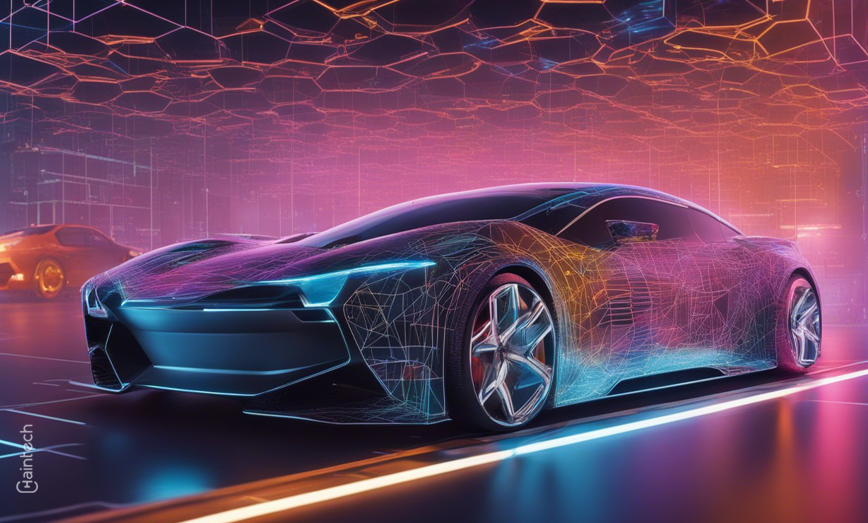Driving into the Future: Blockchain Technology Accelerates Innovation in the Automotive World

Innovation has always played a pivotal role in propelling the automotive industry forward. From Henry Ford’s assembly line to the invention of electric vehicles, advancements continue to shape the way we drive. One of the most exciting technological breakthroughs in recent years is blockchain. Initially associated with cryptocurrencies like Bitcoin, blockchain is now poised to revolutionize the automotive world, offering transformative solutions to longstanding challenges.
As discussed in our previous articles, blockchain is a decentralized digital ledger that records transactions across multiple computers. Its underlying principles of transparency, security, and immutability make it an ideal technology for the automotive industry. By removing the need for intermediaries and ensuring a transparent record of transactions, blockchain technology has the potential to transform various aspects of the automotive sector.
Key features of blockchain technology in the automotive context include tamper-proof records, decentralized consensus mechanisms, and smart contracts. These features enhance trust between parties and enable seamless interactions, offering immense opportunities for innovation.
Blockchain Applications in the Automotive Industry
Supply Chain Management
Supply chain management is a critical aspect of the automotive industry, involving complex processes that span various stakeholders. Blockchain technology can streamline this process by providing a transparent and traceable record of every transaction, from raw material procurement to vehicle assembly and distribution.
By implementing blockchain, automotive companies can ensure the integrity of the supply chain, minimizing the risk of counterfeit parts and fraudulent activities. Additionally, blockchain provides real-time visibility into inventory levels and improves efficiency by automating manual processes, ultimately reducing costs for manufacturers and consumers.
Vehicle Identity and Digital Identity
With the rise of digital systems and connected vehicles, concerns surrounding vehicle identity theft and fraud have become significant. Blockchain technology offers a robust solution by enabling unique vehicle identification and verification through decentralized ledgers.
By combining physical vehicle identification numbers with digital signatures, blockchain ensures an immutable record of a vehicle’s history, preventing tampering and fraudulent activities. Moreover, blockchain-based digital identities for vehicles and owners enhance safety by allowing secure access to services like remote unlocking and personalized driving settings.
Vehicle Data Tracking and Management
Modern vehicles generate enormous amounts of data that can be leveraged for maintenance, diagnostics, and improvements. Blockchain technology provides a secure and decentralized platform for collecting, storing, and managing this data while ensuring privacy and control for vehicle owners.
By integrating blockchain into vehicle systems, manufacturers can enhance data management capabilities, allowing real-time updates on vehicle health, performance, and efficiency. This data can be shared with authorized service providers, creating a seamless ecosystem that benefits manufacturers, owners, and stakeholders in the automotive industry.
Connected and Autonomous Vehicles
Connected and autonomous vehicles rely on seamless communication and coordination between multiple parties, from vehicles to infrastructure and other road users. Blockchain can play a transformative role in ensuring secure and tamper-proof communication channels.
By leveraging blockchain, connected vehicles can establish trust and authenticity in their interactions, facilitating efficient traffic management, collision avoidance, and even smart charging for electric vehicles. Furthermore, the integration of smart contracts enables autonomous vehicles to coordinate actions among themselves, promising enhanced safety and efficiency on the roads.
Shared Mobility and Decentralized Ridesharing
The emergence of ridesharing platforms has disrupted the traditional transportation industry. However, issues such as high transaction costs, lack of transparency, and data privacy concerns still persist. Blockchain technology provides solutions to these challenges by introducing decentralized ridesharing platforms.
By utilizing blockchain’s transparent and secure transaction capabilities, peer-to-peer ridesharing can be facilitated without the need for intermediaries. This not only reduces costs for both riders and drivers but also ensures transparency and accountability in the sharing of data and revenues between the parties involved.
Overcoming Challenges and Considerations
While blockchain holds immense potential for the automotive industry, several challenges and considerations need to be addressed for successful implementation.
Scalability and Performance
Blockchain’s design inherently limits scalability and transaction speed. However, ongoing research and development efforts focus on solutions such as sharding and off-chain protocols to address these limitations. Balancing security and efficiency trade-offs remains a key consideration in deploying blockchain at scale within the automotive context.
Privacy and Data Protection
As vehicles become more connected, ensuring data privacy and protection is paramount. Blockchain-based solutions must comply with data protection regulations and prioritize user consent. Innovations like zero-knowledge proofs and privacy-preserving techniques offer promising avenues to protect sensitive information while leveraging the benefits of blockchain technology.
Standardization and Interoperability
To fully capitalize on the potential of blockchain in the automotive sector, collaboration among stakeholders is crucial. Establishing industry standards and ensuring interoperability between different blockchain platforms enable seamless integration across the industry. Collaborative efforts among automotive manufacturers, technology firms, and blockchain experts can facilitate widespread adoption and maximize the benefits of blockchain technology.
Security and Cybersecurity
Blockchain technology is not invulnerable to cybersecurity threats and requires continuous monitoring and vulnerability management. Protecting connected vehicles and their data from hacking attempts is of utmost importance. By implementing robust security measures and fostering a culture of cybersecurity, the automotive industry can mitigate potential risks associated with blockchain technology.
Future Trends and Opportunities
Looking ahead, blockchain’s role in the automotive world is set to continue evolving. As the technology matures, it will likely integrate with emerging technologies such as artificial intelligence, Internet of Things, and edge computing, opening up new possibilities for enhanced innovation and connectivity.
Collaboration between automotive manufacturers, technology companies, and blockchain experts will be essential in harnessing the full potential of blockchain. Joint ventures, research partnerships, and industry consortia can drive the adoption of blockchain solutions, enabling interoperability and unlocking new business models in the automotive ecosystem.
Conclusion
Blockchain technology stands as a powerful force driving innovation in the automotive industry. With its ability to ensure secure and transparent transactions, streamline supply chain management, and enable disruptive applications like connected and autonomous vehicles, blockchain has the potential to reshape the future of transportation. As the automotive world embraces this transformative technology, the possibilities for innovation and growth are boundless.









